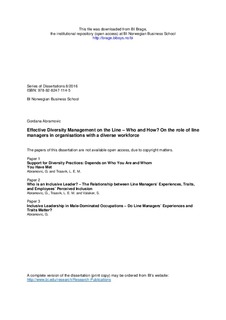| dc.description.abstract | Using three separate studies in the context of ethnic and gender diversity, this dissertation will contribute to theory and research on diversity and human resource management by extending knowledge of how line managers’ experiences, values and orientations may predict their effectiveness in diversity management on the line.
These three independent, yet connected, studies aim to answer three questions emerging from the literature and practice: Do line managers’ (LMs) experiences with different others, values and orientations affect their willingness to implement human resource (HR) diversity practices? Do these LMs’ experiences and traits relate to subordinates’ outcomes in a multicultural workplace? Are these LMs’ experiences and traits associated with subordinates’ outcomes in male-dominated settings? With these three papers, this dissertation contributes to theory and research on the role of LMs in effective diversity management (DM) on the line.
The first study, “Support for diversity practices: Depends on who you are and whom you have met”, demonstrates that contact experiences with diverse others, diversity values and orientation towards other’s interests are associated with willingness to support HR diversity practices.
The second study, “Who is an inclusive leader? – The relationship between line managers’ experiences and traits, and employees’ perceived inclusion”, complements the first study by showing that LMs’ contact experiences with different others and orientation matter for effective DM on the line.
The third study, “Inclusive leadership in male-dominated occupations – Do line managers’ experiences and traits matter?”, continues the investigation of LMs’ experiences and traits, which may be important for DM on the line. In this study, another dimension of diversity was investigated – gender. The findings showed that none of the investigated male LMs’ experiences and traits were related to perceptions of supportive and/or inclusive leader for female subordinates, which might imply that perceptions of LMs and their support is more important in such a context than who they are.
Consequently, the three studies unite to demonstrate that more comprehensive research within the area of effective DM on the line may be achieved by acknowledging the uniqueness of HR diversity practices and taking into account LMs’ individual experiences and characteristics, as well as employees’ perceptions of their supportive behaviour. The findings of this dissertation highlight that explicitly recognising and taking into account LMs’ intergroup contact quality, other-orientation and how supportive they are perceived by subordinates would improve our ability to predict effectiveness of DM on the line across settings and diversity dimensions. Accordingly, this dissertation broadens and supplements existing literatures on DM and HRM by disentangling who delivers effective DM and how they do it on the line. | nb_NO |
